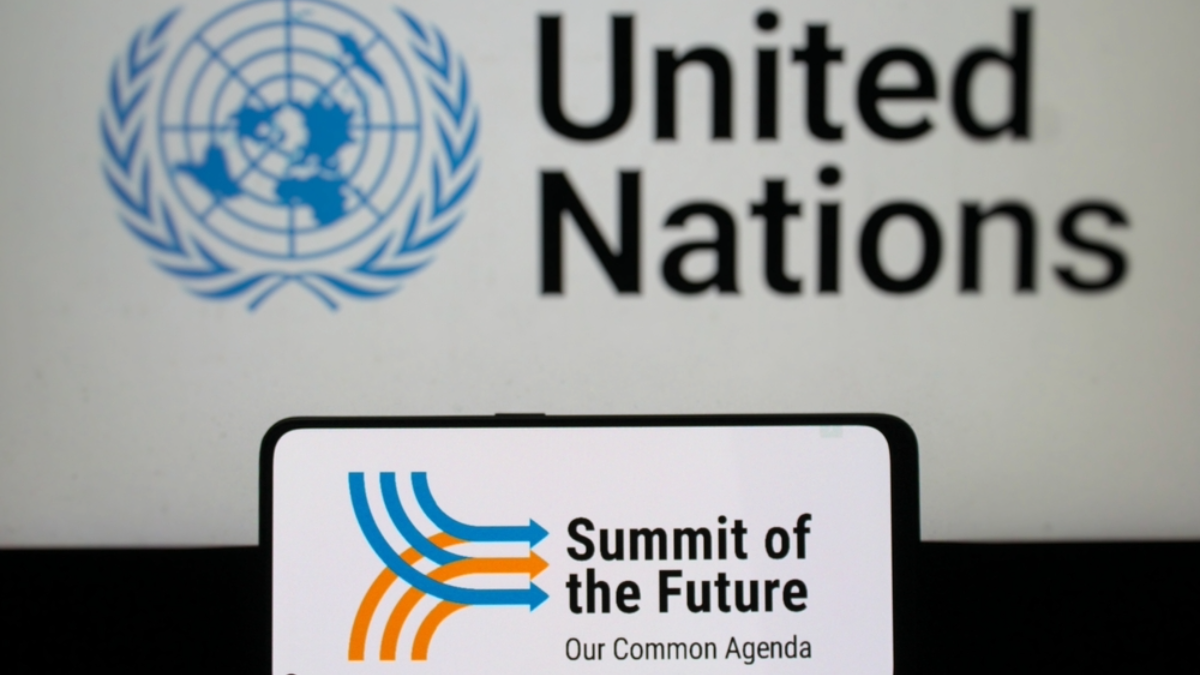Will the UN Global Digital Compact Bring Light to Democracies?
Sebastian Becker Castellaro / Oct 8, 2024In 2024, almost 3 billion people voted or will have the opportunity to participate in elections, including in countries such as the US, South Africa, India, Indonesia, Ghana, and Japan, among others. On top of that, mis- and disinformation has been labelled as ‘the’ biggest short-term global risk by the World Economic Forum. These two facts fall into a general context where democracies worldwide are in decline.
It is in this context that, on 22 September, the United Nations adopted the Global Digital Compact (GDC), a set of fundamental principles and recommendations to create an “inclusive, open, sustainable, fair, safe and secure digital future for all”.
The GDC is built on foundational principles, including human rights online, safe and secure digital environments, and digital innovation for sustainable development, among others. Aspects such as the protection of privacy and freedom of expression, addressing threats of misinformation, and improving transparency and accountability among online social media companies are included in its recommendations. However, the word ‘democracy’ appears only once in the document, despite the fact that on the margins of the UN General Assembly democracy was a central theme.
Given the multi-year phenomenon of global democratic erosion, it makes sense to ask whether the Compact will be a tool to bolster democracies.
Human rights online: freedom of expression and privacy are cornerstones for democracy.
According to the latest International IDEA report, compared with 2018, 38 countries around the world have experienced declines in their levels of freedom of expression and freedom of the press. The use of spyware against journalists in Greece and Morocco or the block on Instagram in Turkey are examples of threats to free expression.
Despite these circumstances, signatories to the GDC commit merely to “refrain from imposing restrictions on the free flow of information and ideas that are inconsistent with obligations under international law” and to “refrain from Internet shutdowns and measures that target internet access.” Both statements, although valuable, fail to provide meaningful and adequate human rights safeguards based on the current state of democracies. Human rights restrictions must follow a proportionality test ordered by a judicial authority, meaning they must comply with the requirements of legality, proportionality and necessity in a democratic society. This lack of depth does not adequately tackle the increase of Internet shutdowns around the world or authoritarian regimes censoring legitimate speech through arbitrary (il)legal means.
Similarly, the GDC calls on its signatories to “[e]nsure laws and regulations on the use of technology in areas such as surveillance and encryption, are in compliance with international law.” While this establishes a minimum legal safeguard against surveillance, it does not embed International Human Rights Law (IHRL) standards.
Mass surveillance is a repressive mechanism to shrink civic spaces. As a result, surveillance technologies should be limited to solely legitimate aims based on a proportionality test. Encryption and anonymity tools are crucial tools for journalists and human rights defenders to uphold democracies. The GDC missed the chance to explicitly urge both governments and tech corporations to protect and promote anonymity tools and encryption in support of human rights and democracy.
The emergency to protect information integrity
Information integrity includes on one side a free flow of information, and on the other side, trustworthy and reliable information. This is vital to ensure effective participation in democracies and to safeguard the integrity of elections. Under its digital trust and safety section, the GDC calls to “urgently counter and address” gender-based violence, hate speech and disinformation. Notably, the Compact understands that information integrity is crucial to “protect democratic processes.”
It is true: disinformation is undermining the pillars of democracy. Information has been weaponized by both domestic and foreign actors alike to advance an authoritarian capture of public discourse. As a clear example, the contestation of electoral results or refusal to accept them goes hand-in-hand with coordinated efforts to manipulate information. Between mid-2020 and mid-2024, one in every three elections was disputed. In one in five elections, losing parties or candidates refused to recognize the results. Sometimes overlapping with refusals to concede, nearly 20% of elections were challenged in court. In nearly all of these cases, coordinated narratives attacking the integrity of the electoral process were deployed, such as in Peru or Brazil. This is extremely concerning.
At the center of the storm are social media platforms and their ranking and recommender algorithms. The increasingly prominent role of these platforms in spreading disinformation through their algorithms is well-addressed in the GDC. The compact calls for enhancing transparency and accountability in content moderation policies and recommender algorithms, including providing data access to "build the evidence base on how to address misinformation and hate speech." These are key measures to counter disinformation and hate speech in online spaces.
However, the elephant in the room during the GDC negotiations was the role of the business models of Big Tech companies in the dissemination of disinformation and hate speech. The attention economy, driven by the ad-tech industry, prioritizes maximizing engagement. This, in turn, incentivizes the creation of viral content which often relies on sensationalism filled with disinformation, inflammatory and misleading content. Additionally, the exploitation of personal data fuels the ad-tech industry's algorithms to generate more "engaging" and radical content.
A structural problem requires structural solutions.
International stakeholders should put forward structural (economic) mechanisms to decrease algorithmic recommender systems’ impact on democratic processes. Unfortunately, a mere commitment to empower individuals “with the ability to consider, give and withdraw their consent to the use of their data” is not enough to mitigate the impact that micro-targeting techniques and the role of algorithms are having on our democracy.
No role of Big Tech companies in climate change?
Based on the GDC, Big Tech companies are only a solution, and not a cause, of climate change.
Although the third version of the GDC included that digital infrastructure and equipment should be “designed for the mitigation and adaptation to climate change”, this crucial statement was removed in its final version. Despite there being clear evidence of the huge impact of digital technologies on energy demand, extraction of raw materials, e-waste production and greenhouse emissions, the GDC commits to addressing only “environmental challenges” in the “digital future.”
Current estimates show that information and communication technology (ICT) contributes up to 3.9% of global greenhouse gas (GHG) emissions compared to roughly 2.5% for global air travel. For 2027, studies show the total energy consumption of AI is estimated to rival the energy demand of Argentina or the Netherlands.
The lack of transparency and accountability of tech companies in these issues should be stressed as urgent. Stakeholders should put forward policies, legal measures and binding mechanisms that take up the banner for environmental and climate protection where the tech sector plays an important role.
What’s next?
Despite the lack of nuance and depth, the GDC is a non-binding agreement that can be stressed nationally and internationally to promote an expansive version of protecting human rights, combating climate change and endorsing democratic values worldwide. Thus, its implementation and monitoring by all stakeholders will be the key.
Scrutiny should not only be applied through the mechanisms put forward by the GDC, such as the “modalities for the voluntary endorsement of this Compact,” the “implementation map for the consideration of Government and other stakeholders,” or the potential office to “facilitate system-wide coordination,” among others. Rather, the implementation and monitoring should engage all stakeholders outside the margins of the GDC. WSIS+20, RightsCon, and the Internet Governance Forum (IGF) are other multi-stakeholder forums where organizations could follow up and ensure a proper implementation. On top of that, States could strengthen human rights-centric digital initiatives through diplomatic efforts.
Only if the GDC is taken as the bare minimum floor from which to demand structural changes can this compact serve as a tool for advancing democracy in a digital future.
Authors

